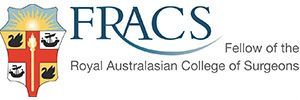Oesophagogastric Cancer
Oesophagogastric cancer is a significant diagnosis and is a highly stressful thing to be told. Many complex factors influence treatment options. These options may include chemotherapy, radiotherapy, immunotherapy, radiology and surgery. A large team will often be involved, with many things occurring in the background as you progress through treatment.
Patients are all individuals, and the information here serves only as a guide to what to expect and provides some information on cancer surgery.
What is Oesophagogastric Cancer Surgery?
Oesophagogastric cancer surgery is aimed at removing cancerous tumours or affected tissue in the oesophagus and/or stomach. The primary goal of this surgery is to eliminate cancer cells, prevent the spread of the disease, and improve the patient's quality of life and survival.
Who is a Candidate for Oesophagogastric Cancer Surgery?
Candidates for oesophagogastric cancer surgery are individuals who have been diagnosed with cancer in the oesophagus or the gastroesophageal junction (where the oesophagus meets the stomach).
It's essential to note that not all patients with these types of cancer are suitable candidates for surgery. The decision to undergo surgery is typically based on several factors, including:
- Stage of Cancer: Surgery is more likely to be considered for early-stage cancers.
- Overall Health: Individuals with underlying health conditions that make surgery risky might be considered for alternative treatments.
- Extent of Tumour: Surgery may not be the best option if the tumour is too large or has spread extensively.
- Patient's Willingness: The patient's willingness to undergo surgery and their understanding of the potential risks and benefits are also considered.
- Response to Preoperative Treatment: Sometimes, patients receive chemotherapy or radiation therapy (or both) before surgery to shrink the tumour. The response to these treatments can influence the decision for surgery.
Types of Oesophagogastric Cancer Surgery
Here are some common types of oesophagogastric cancer surgery:
- Oesophagectomy: This surgery involves the removal of a portion or the entire oesophagus, followed by reconstruction to restore the digestive tract's continuity.
- Gastrectomy: When cancer affects the stomach, a gastrectomy may be performed. This involves removing a portion or all of the stomach, depending on the extent of the cancer.
- Lymph Node Dissection: During surgery, nearby lymph nodes may be removed and examined to determine if the cancer has spread.
- Minimally Invasive Surgery: Some oesophagogastric surgeries can be performed using minimally invasive techniques. These approaches often result in smaller incisions, shorter recovery times, reduced postoperative pain and reduced respiratory complications.
Preparation Before Oesophagogastric Cancer Surgery
- Consultation and Evaluation: Before surgery, you will have a thorough consultation with your healthcare team, including your surgeon, radiation oncologist and medical oncologist. They will evaluate your overall health and discuss the options in detail.
- Investigations: You may undergo various tests such as blood tests, imaging scans (like CT and/or PET scan and/or MRI), and endoscopy to assess the extent of the cancer and your general health.
- Multidisciplinary Team Discussion: Your case will usually be discussed at a large meeting to gain consensus on your diagnosis and recommended treatment plan.
- Medical Optimisation: Your team will work with you to optimise your overall health. This may involve managing chronic conditions, such as diabetes or high blood pressure, and addressing nutritional deficiencies. This may also involve exercise testing and pre-surgery exercise programmes (pre-hab).
- Smoking Cessation: If you smoke, quitting before surgery is highly recommended, as smoking can impair the healing process and increase the risk of complications.
- Fitness Testing: Often, fitness testing is done to quantify the risk of the operation/treatment to the patient.
- Prehabilitation: Some patients may benefit from a pre-operative fitness program.
- Nutritional Assessment: Patients with oesophagogastric cancer often experience difficulty swallowing, which can lead to malnutrition. A dietitian may evaluate your dietary needs and recommend interventions to improve your nutritional status before surgery. This may involve a nasogastric feeding tube.
- Nasogastric feeding tube: May be needed preoperatively to improve your nutrition.
- Preoperative Education: You will learn what to expect during and after surgery. Understanding the procedure, potential risks, and recovery process is essential.
What to Expect After Oesophagogastric Cancer Surgery?
You will wake up in the recovery room, where medical staff will closely monitor your vital signs and manage pain or discomfort. The length of your hospital stay will depend on the complexity of the surgery and your recovery progress. It may range from a few days to a couple of weeks.
Oesophagogastric Cancer Surgery Recovery Plan
- Dietary Changes: You will likely need to make dietary adjustments due to the changes in your digestive system. A dietitian can help you plan a suitable diet.
- Medication Management: Follow your healthcare team's medication instructions, especially if you are on medications for pain, infection prevention, or other specific needs.
- Wound Care: Take care of your incisions as directed. Keep them clean and dry to prevent infection.
- Gradual Activity: Initially, you may need to limit physical activity. As you recover, gradually increase your activity level under the guidance of your healthcare team.
- Follow-up Appointments: Attend all scheduled follow-up appointments with your surgeon and oncologist to monitor your progress and address concerns.
- Emotional Support: Continue to seek emotional support from friends, family, or support groups as needed.
- Long-term Monitoring: Depending on the stage and type of cancer, you may require ongoing monitoring and potential adjuvant treatments such as chemotherapy or radiation therapy.
- Long-term side effects: Some patients may suffer from reflux, decreased appetite, differences in swallowing, weight loss and lethargy after treatment.
Oesophagogastric Cancer Surgery Prognosis
The prognosis for individuals undergoing oesophagogastric cancer surgery can vary significantly based on several factors, including:
- Early-stage cancers are associated with a better prognosis, as they are more likely to be completely removed with surgery.
- Smaller tumours are generally associated with a more favourable prognosis, as they are easier to resect completely.
- If cancer has spread to nearby lymph nodes, it may affect prognosis negatively. Lymph node involvement indicates a more advanced stage of the disease.
- The specific type of oesophagogastric cancer can impact prognosis.
- Patients in good overall health often have better outcomes.
Oesophagogastric Cancer Surgery Risks
Oesophagogastric cancer surgery, like any major surgical procedure, carries risks and potential complications. These risks may include:
- Bleeding
- Infection
- Pneumonia
- Leakage from the reconstructed organs
- Difficulty swallowing
- Nutritional deficiencies
Hunter Weight Loss specialisTS in Weight Loss Surgery in Newcastle, Maitland, and Lake Macquarie
Our Locations
Hunter Weight Loss & Upper GI
Ground Floor
37 Llewellyn Street,
Merewether, NSW 2291
Maitland Private Hospital
Specialist Suites
Suite 10, 175 Chisholm Rd,
East Maitland, 2323
Contact Us

Practice Hours
Mon - Fri: 9:00 am - 5:00 pm
Sat - Sun: Closed
Public Holidays: Closed
All Rights Reserved | Hunter Weight Loss
Weight Loss Surgeons Newcastle, Maitland, and Lake Macquarie





